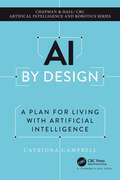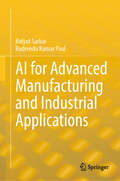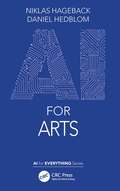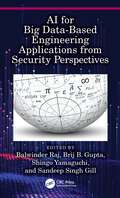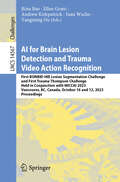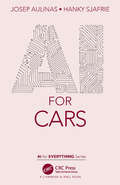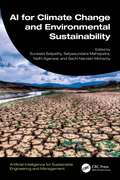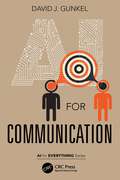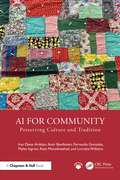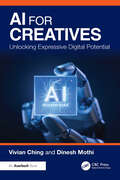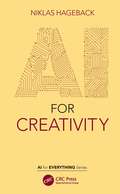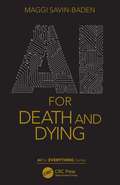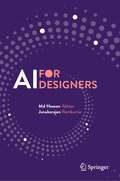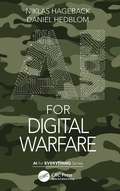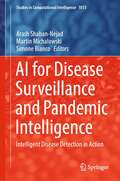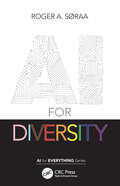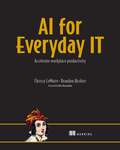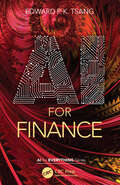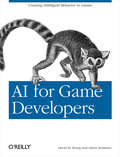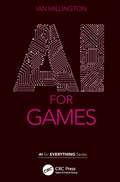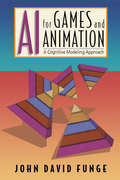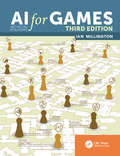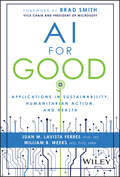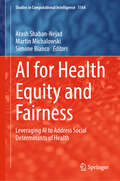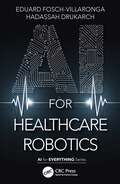- Table View
- List View
AI by Design: A Plan for Living with Artificial Intelligence (Chapman & Hall/CRC Artificial Intelligence and Robotics Series)
by Catriona CampbellThis book introduces the reader to Artificial Intelligence and its importance to our future. Campbell uses behavioural psychology, explores technology, economics, real-life and historical examples to predict five future scenarios with AI. Illustrating through speculative fiction, she describes possible futures after AI exceeds human capabilities. We are at a tipping point in history and must plan to ensure a successful co-existence with artificial intelligence. This book explains how to design for a future with AI so that, rather than herald our downfall, it helps us achieve a new renaissance.
AI for Advanced Manufacturing and Industrial Applications
by Bidyut Sarkar Rudrendu Kumar PaulThis book provides a deep dive into the applications of Artificial Intelligence (AI) in advanced manufacturing and intelligent autonomous systems. Through real-world use cases and cutting-edge insights, it examines how AI, machine learning, IoT, and Industry 5.0 are revolutionizing manufacturing processes from end to end. Discover how integrating AI technologies with data analytics and IoT can unlock smarter, more efficient, and adaptable manufacturing solutions. Learn how predictive algorithms can foresee equipment failures, optimize inventory in real time, and enable autonomous robots to handle complex tasks, from assembly to logistics. With these innovations, manufacturers can achieve new levels of productivity, drive innovation, and create future-ready business models. Designed for industry practitioners, decision-makers, and aspiring professionals, this comprehensive guide offers actionable strategies and practical insights for implementing AI in advanced manufacturing. Whether you&’re a leader seeking to modernize operations or a graduate student aiming to enter this dynamic field, this book will empower you to navigate and leverage the next frontier of industrial innovation.
AI for Arts (AI for Everything)
by Niklas Hageback Daniel HedblomAI for Arts is a book for anyone fascinated by the man–machine connection, an unstoppable evolution that is intertwining us with technology in an ever-greater degree, and where there is an increasing concern that it will be technology that comes out on top. Thus, presented here through perhaps its most esoteric form, namely art, this unfolding conundrum is brought to its apex. What is left of us humans if artificial intelligence also surpasses us when it comes to art? The articulation of an artificial intelligence art manifesto is long overdue, so hopefully this book can fill a gap that will have repercussions not only for aesthetic and philosophical considerations but possibly more so for the development of artificial intelligence.
AI for Big Data-Based Engineering Applications from Security Perspectives
by Balwinder RajArtificial intelligence (AI), machine learning, and advanced electronic circuits involve learning from every data input and using those inputs to generate new rules for future business analytics. AI and machine learning are now giving us new opportunities to use big data that we already had, as well as unleash a whole lot of new use cases with new data types. With the increasing use of AI dealing with highly sensitive information such as healthcare, adequate security measures are required to securely store and transmit this information. This book provides a broader coverage of the basic aspects of advanced circuits design and applications. AI for Big Data-Based Engineering Applications from Security Perspectives is an integrated source that aims at understanding the basic concepts associated with the security of advanced circuits. The content includes theoretical frameworks and recent empirical findings in the field to understand the associated principles, key challenges, and recent real-time applications of advanced circuits, AI, and big data security. It illustrates the notions, models, and terminologies that are widely used in the area of Very Large Scale Integration (VLSI) circuits, security, identifies the existing security issues in the field, and evaluates the underlying factors that influence system security. This work emphasizes the idea of understanding the motivation behind advanced circuit design to establish the AI interface and to mitigate security attacks in a better way for big data. This book also outlines exciting areas of future research where already existing methodologies can be implemented. This material is suitable for students, researchers, and professionals with research interest in AI for big data–based engineering applications, faculty members across universities, and software developers.
AI for Brain Lesion Detection and Trauma Video Action Recognition: First BONBID-HIE Lesion Segmentation Challenge and First Trauma Thompson Challenge, Held in Conjunction with MICCAI 2023, Vancouver, BC, Canada, October 16 and 12, 2023, Proceedings (Lecture Notes in Computer Science #14567)
by Andrew Kirkpatrick Rina Bao Ellen Grant Juan Wachs Yangming OuThis book constitutes the proceedings of the First BONBID-HIE Lesion Segmentation Challenge and the First Trauma Thompson Challenge, held in conjunction with MICCAI 2023, in Vancouver, BC, Canada, during October 2023. For BONBID-HIE 2023 Challenge 6 papers have been accepted out of 14 submissions. They span a broad array of approaches leveraging anatomical information about HIE, data augmentation, training strategies, model architecture, and integration with traditional machine learning methods. For the TTC 2023 Trauma Thompson Challenge 4 accepted contributions are included in this book. They deal with advancements in machine learning methods and their practical applications in addressing small and diffuse lesions in HIE segmentation.
AI for Cars (AI for Everything)
by Hanky Sjafrie Josep AulinasArtificial Intelligence (AI) is undoubtedly playing an increasingly significant role in automobile technology. In fact, cars inhabit one of just a few domains where you will find many AI innovations packed into a single product. AI for Cars provides a brief guided tour through many different AI landscapes including robotics, image and speech processing, recommender systems and onto deep learning, all within the automobile world. From pedestrian detection to driver monitoring to recommendation engines, the book discusses the background, research and progress thousands of talented engineers and researchers have achieved thus far, and their plans to deploy this life-saving technology all over the world.
AI for Climate Change and Environmental Sustainability (Artificial Intelligence for Sustainable Engineering and Management)
by Suneeta Satpathy Sachi Nandan Mohanty Satyasundara Mahapatra Nidhi AgarwalThis book discusses the adverse effects of climatic changes on our planet. It examines AI-based tools and technologies and how they can assist in identifying energy emission reductions, CO2 removal, and support the development of greener transportation networks, monitoring deforestation, and forecasting extreme weather events.AI for Climate Change and Environmental Sustainability identifies and discusses in detail the importance of environmental sustainability based on accomplishment of the UN's 17 Sustainable Developmental Goals (SDGs). It presents the various AI-based possibilities for accelerating international efforts to safeguard the environment and conserve natural resources. The authors offer a comprehensive analysis of the emerging field of climate change in relation to Internet of Things, artificial intelligence, machine learning, and deep learning. The book discusses AI developments, applications, and best practices that will help us transition to a low-carbon future on both a regional and global scale. It provides case studies with analytical results pertinent to climate change and weather prediction and includes chapters with a research-oriented approach, which can encourage new developments in the field of sustainable climate and green environment.The book can be used as a primary textbook for graduate and postgraduate students in technology and science, as well as a reference for researchers, academics, and IT professionals working on climate change and sustainability initiatives.
AI for Communication (AI for Everything)
by David J. GunkelAI for Communication offers an engaging exploration into the diverse applications of artificial intelligence (AI) within the realm of communication. By bridging the gap between the scientific and engineering realms of AI and communication, this book reveals how AI, since its inception during the Dartmouth Summer workshop of 1956, has inherently been a science of communication. Exploring key advancements such as machine translation, natural language processing, large language models, computational creativity, and social robotics, this book shows how these innovations not only disrupt but also actively transform human communication.The book is designed for students, teachers, and general readers who want to know how the field of communication impacts and influences the theory and practice of AI and how recent developments in AI will affect all aspects of human social interaction.
AI for Community: Preserving Culture and Tradition
by Fernando Gonzalez Iran Davar Ardalan Amir Banifatemi Myles Ingram Reza Moradinezhad Lucretia WilliamsAI for Community explores the transformative potential of technology to bridge cultural divides and responsibly preserve cultural heritage, while thoughtfully considering how to ensure fairness without any ideological or cultural bias. It acknowledges the need for careful scrutiny of traditions so that artificial intelligence (AI) systems can promote comprehensive cultural understanding. This approach underscores the promise of AI as a tool for human flourishing.Authored by a multigenerational, multicultural team, this book presents real‑world examples and ethical insights that are timely, actionable, and deeply human‑centered. It introduces pioneering projects like the Indigenous Knowledge Graph, which documented ancestral wisdom; Howard University’s Project Elevate Black Voices, funded by Google, which enhanced speech recognition for African American Vernacular English (AAVE); and Laleh AI, which posthumously preserves the insights of a progressive female Islamic thinker. Also, initiatives like UNESCO’s work on cultural heritage preservation and NVIDIA’s collaboration with Te Hiku Media to safeguard the Māori language showcase AI’s vital role in reviving endangered languages.This book interweaves "Community Voices" sections between chapters, featuring interviews that explore the role and implementation of AI in new arenas. Each chapter is also supported by online resources, accessible as podcasts, videos, and articles, that provide multimedia ways to deepen understanding of culturally aware AI.AI for Community highlights how community‑driven language preservation, storytelling, and inclusive design can empower cultures and protect their heritage. This book is a vital resource for those seeking to create AI that respects and uplifts communities.
AI for Creatives: Unlocking Expressive Digital Potential
by Vivian Ching Dinesh MothiAI for Creatives: Unlocking Expressive Digital Potential takes you on a dynamic journey into the future of creativity, where AI is reshaping how creators approach their craft. According to a 2023 UNESCO report, the global creative industries are valued at an astounding USD 4.3 trillion annually, employing nearly 30 million people worldwide. This essential guide empowers professionals across visual arts, music, writing, film, fashion, and design to leverage the transformative potential of AI to elevate their work in ways previously unimaginable.Designed as a practical handbook for creative professionals, this book provides a clear and approachable road map for integrating AI into your work, regardless of prior experience. Packed with real-world case studies, step-by-step walk-throughs, and insights into AI-driven tools, like RunwayML, Midjourney, Canva, and ChatGPT, the book demonstrates how AI can supercharge creative processes. Whether you are a filmmaker using AI for hyper-realistic visuals or a fashion designer predicting fabric trends, this guide offers the tools to unlock your full creative potential.The book also dives into the deeper ethical and legal questions that emerge as machines increasingly enter the creative arena. How do we strike the right balance between human ingenuity and machine-driven creativity? What happens to intellectual property rights when AI becomes a co-creator? This book tackles these pressing issues head-on, from navigating bias in AI algorithms to safeguarding the authenticity of creative works, while also exploring the role of education in navigating these challenges. With actionable insights, creative professionals will learn to embrace AI while preserving the integrity, originality, and values that define their craft.AI is not just changing how we create but also disrupting the future of employment and economic growth across the globe. With the demand for creative roles projected to surge by 30–40% by 2030, it is evermore critical to harness the power of AI to stay ahead, innovate faster, and meet the growing need for creative solutions across industries. Are you ready to explore the future of creativity and amplify your vision? Step into the next era of AI transformation with this essential guide—your creative revolution starts now.
AI for Creativity (AI for Everything)
by Niklas HagebackWhat is computational creativity? Can AI learn to be creative? One of the human mind’s most valuable features is the capacity to formulate creative thoughts, an ability that through quantum leap innovations has propelled us to the current digital age. However, creative breakthroughs are easier said than done. Appearing less frequently and more sporadically than desired, it seems that we have not yet fully cracked the creative code. But with the rapid advances in artificial intelligence which have come to provide an ever-closer proximity with the cognitive faculties of mankind, can this emerging technology improve our creative capabilities? What will that look like and will it be the missing link in the man–machine enigma? AI for Creativity provides a fascinating look at what is currently emerging in the very cutting-edge area of artificial intelligence and the tools being developed to enable computational creativity that holds the propensity to dramatically change our lives.
AI for Death and Dying (AI for Everything)
by Maggi Savin-BadenWhat is artificial intelligence (AI)? How does AI affect death matters and the digital beyond? How are death and dying handled in our digital age? AI for Dying and Death covers a broad range of literature, research and challenges around this topic. It explores ethical memorisation, digital legacies and bereavement, post death avatars and AI and the digital beyond. It also analyzes religious perspectives on AI for death and dying, and planning for death in a digital age. Maggi Savin-Baden is a Professor of Education at the University of Worcester and has researched and evaluated staff and student experiences of learning for over 20 years and gained funding in this area (Leverhulme Trust, JISC, Higher Education Academy, MoD). She has a strong publication record of over 50 research publications and 17 books which reflect her research interests on the impact of innovative learning, digital fluency, cyber-influence, pedagogical agents, qualitative research methods and problem-based learning. In her spare time, she runs, bakes, climbs and attempts triathalons.
AI for Designers
by Md Haseen Akhtar Janakarajan RamkumarThis book presents select research writings from researchers and professionals around the globe on the application, potential, and limitations of AI in different domains. The topics covered include AI in product design, AI in architecture design, AI in textile design, AI in interaction design, and AI for society in general. The book also discusses various cross-applications of AI in other industrial sectors like urban planning and design, AI for inclusive future, etc. The book is a valuable reference for designers in multidisciplinary areas. This book is of interest for anyone who is a beginner, researcher, and professional interested in artificial intelligence and allied fields.
AI for Digital Warfare (AI for Everything)
by Niklas Hageback Daniel HedblomAI for Digital Warfare explores how the weaponising of artificial intelligence can and will change how warfare is being conducted, and what impact it will have on the corporate world. With artificial intelligence tools becoming increasingly advanced, and in many cases more humanlike, their potential in psychological warfare is being recognised, which means digital warfare can move beyond just shutting down IT systems into more all-encompassing hybrid war strategies.
AI for Disease Surveillance and Pandemic Intelligence: Intelligent Disease Detection in Action (Studies in Computational Intelligence #1013)
by Simone Bianco Arash Shaban-Nejad Martin MichalowskiThis book aims to highlight the latest achievements in the use of artificial intelligence for digital disease surveillance, pandemic intelligence, as well as public and clinical health surveillance. The edited book contains selected papers presented at the 2021 Health Intelligence workshop, co-located with the Association for the Advancement of Artificial Intelligence (AAAI) annual conference, and presents an overview of the issues, challenges, and potentials in the field, along with new research results. While disease surveillance has always been a crucial process, the recent global health crisis caused by COVID-19 has once again highlighted our dependence on intelligent surveillance infrastructures that provide support for making sound and timely decisions. This book provides information for researchers, students, industry professionals, and public health agencies interested in the applications of AI in population health and personalized medicine.
AI for Diversity (AI for Everything)
by Roger A. SøraaArtificial intelligence (AI) is increasingly impacting many aspects of people’s lives across the globe, from relatively mundane technology to more advanced digital systems that can make their own decisions. While AI has great potential, it also holds great peril depending on how it is designed and used. AI for Diversity questions how AI technology can lead to inclusion or exclusion for diverse groups in society. The way data is selected, trained, used, and embedded into societies can have unfortunate consequences unless we critically investigate the dangers of systems left unchecked, and can lead to misogynistic, homophobic, racist, ageist, transphobic, or ableist outcomes. This book encourages the reader to take a step back to see how AI is impacting diverse groups of people and how diversity-awareness strategies can impact AI.
AI for Everyday IT: Accelerate workplace productivity
by Chrissy LeMaire Brandon AbshireAutomate and accelerate your everyday IT tasks with instant solutions!What if you never had to write another after-incident report, piece of boilerplate code, or a performance review from scratch ever again? Use AI tools like ChatGPT, Claude, Gemini, and Copilot right, and you&’ll take back hours of your time—and more! AI for Everyday IT reveals how you can automate dozens of your daily IT tasks with generative AI. In AI for Everyday IT you&’ll learn how to: • Write effective prompts for common IT tasks • Optimize report generation, document handling, and workplace communication • Resolve IT conflicts and crises • Acquire new skills and upgrade your resume • AI for help desk, database administration and systems administration • Incorporate AI into DevOps processes and create AI-powered applications • Simplify time-consuming people management tasks In this hands-on guide, automation experts Chrissy LeMaire and Brandon Abshire show you how AI tools like ChatGPT have made their lives a million times easier, and how they can do the same for you. You&’ll find proven strategies for using AI to improve help desk support, automate sysadmin and database tasks, aid with DevOps engineering, handle managing IT teams, and dozens more time-saving and quality-improving hacks. Foreword by Nitya Narasimhan. About the technology Have you lost days sifting through logs to find a latency issue? AI can do it in seconds! Need to update your documentation? Mere moments for AI. Are you writing scripts, designing data recovery strategies, and evaluating network designs? AI can handle it all—if you know how to use it. About the book AI for Everyday IT shows you exactly how AI can transform support desk operations, root cause analysis, disaster recovery planning—even writing professional emails when you&’re too furious to be nice! This instantly-useful guide has time-saving techniques for all IT pros—from devs and DBAs to technical writers and product managers. Each relatable example is fully illustrated with the prompts and problem formulation strategies, along with interesting insights and anecdotes from authors Chrissy Lemaire and Brandon Abshire. What's inside • Document handling and workplace communication • Database administration and development • DevOps engineering and AI powered apps • People management and career planning About the reader Whether you&’re working in operations, development, management, or security, you&’ll love these productivity hacks for generative AI. No previous AI experience required. About the author Chrissy LeMaire is a dual Microsoft MVP and GitHub Star, the creator of dbatools, and author of the Manning book Learn dbatools in a Month of Lunches. Brandon Abshire has spent over twenty years in IT, including roles at a leading Fortune 500 semiconductor and telecommunications company and multiple top-ranked US hospital systems.
AI for Finance (AI for Everything)
by Edward P. TsangFinance students and practitioners may ask: can machines learn everything? Could AI help me? Computing students or practitioners may ask: which of my skills could contribute to finance? Where in finance should I pay attention? This book aims to answer these questions. No prior knowledge is expected in AI or finance. To finance students and practitioners, this book will explain the promise of AI, as well as its limitations. It will cover knowledge representation, modelling, simulation and machine learning, explaining the principles of how they work. To computing students and practitioners, this book will introduce the financial applications in which AI has made an impact. This includes algorithmic trading, forecasting, risk analysis portfolio optimization and other less well-known areas in finance. This book trades depth for readability. It aims to help readers to decide whether to invest more time into the subject. This book contains original research. For example, it explains the impact of ignoring computation in classical economics. It explains the relationship between computing and finance and points out potential misunderstandings between economists and computer scientists. The book also introduces Directional Change and explains how this can be used.
AI for Game Developers: Creating Intelligent Behavior in Games
by Glenn Seemann David M BourgAdvances in 3D visualization and physics-based simulation technology make it possible for game developers to create compelling, visually immersive gaming environments that were only dreamed of years ago. But today's game players have grown in sophistication along with the games they play. It's no longer enough to wow your players with dazzling graphics; the next step in creating even more immersive games is improved artificial intelligence, or AI.Fortunately, advanced AI game techniques are within the grasp of every game developer--not just those who dedicate their careers to AI. If you're new to game programming or if you're an experienced game programmer who needs to get up to speed quickly on AI techniques, you'll find AI for Game Developers to be the perfect starting point for understanding and applying AI techniques to your games.Written for the novice AI programmer, AI for Game Developers introduces you to techniques such as finite state machines, fuzzy logic, neural networks, and many others, in straightforward, easy-to-understand language, supported with code samples throughout the entire book (written in C/C++). From basic techniques such as chasing and evading, pattern movement, and flocking to genetic algorithms, the book presents a mix of deterministic (traditional) and non-deterministic (newer) AI techniques aimed squarely at beginners AI developers. Other topics covered in the book include:Potential function based movements: a technique that handles chasing, evading swarming, and collision avoidance simultaneouslyBasic pathfinding and waypoints, including an entire chapter devoted to the A* pathfinding algorithmAI scriptingRule-based AI: learn about variants other than fuzzy logic and finite state machinesBasic probabilityBayesian techniquesUnlike other books on the subject, AI for Game Developers doesn't attempt to cover every aspect of game AI, but to provide you with usable, advanced techniques you can apply to your games right now. If you've wanted to use AI to extend the play-life of your games, make them more challenging, and most importantly, make them more fun, then this book is for you.
AI for Games (AI for Everything)
by Ian MillingtonWhat is artificial intelligence? How is artificial intelligence used in game development? Game development lives in its own technical world. It has its own idioms, skills, and challenges. That’s one of the reasons games are so much fun to work on. Each game has its own rules, its own aesthetic, and its own trade-offs, and the hardware it will run on keeps changing. AI for Games is designed to help you understand one element of game development: artificial intelligence (AI).
AI for Games and Animation: A Cognitive Modeling Approach
by John David FungeJohn Funge introduces a new approach to creating autonomous characters. Cognitive modeling provides computer-animated characters with logic, reasoning, and planning skills. Individual chapters in the book provide concrete examples of advanced character animation, automated cinematography, and a real-time computer game. Source code, animations, imag
AI for Games, Third Edition
by Ian MillingtonAI is an integral part of every video game. This book helps professionals keep up with the constantly evolving technological advances in the fast growing game industry and equips students with up-to-date information they need to jumpstart their careers. This revised and updated Third Edition includes new techniques, algorithms, data structures and representations needed to create powerful AI in games. Key Features A comprehensive professional tutorial and reference to implement true AI in games Includes new exercises so readers can test their comprehension and understanding of the concepts and practices presented Revised and updated to cover new techniques and advances in AI Walks the reader through the entire game AI development process
AI for Good: Applications in Sustainability, Humanitarian Action, and Health
by Juan M. Lavista Ferres William B. WeeksDiscover how AI leaders and researchers are using AI to transform the world for the better In AI for Good: Applications in Sustainability, Humanitarian Action, and Health, a team of veteran Microsoft AI researchers delivers an insightful and fascinating discussion of how one of the world’s most recognizable software companies is tacking intractable social problems with the power of artificial intelligence (AI). In the book, you’ll learn about how climate change, illness and disease, and challenges to fundamental human rights are all being fought using replicable methods and reusable AI code. The authors also provide: Easy-to-follow, non-technical explanations of what AI is and how it works Examinations of how healthcare is being improved, climate change is being addressed, and humanitarian aid is being facilitated around the world with AI Discussions of the future of AI in the realm of social benefit organizations and efforts An essential guide to impactful social change with artificial intelligence, AI for Good is a must-read resource for technical and non-technical professionals interested in AI’s social potential, as well as policymakers, regulators, NGO professionals, and, and non-profit volunteers.
AI for Health Equity and Fairness: Leveraging AI to Address Social Determinants of Health (Studies in Computational Intelligence #1164)
by Simone Bianco Arash Shaban-Nejad Martin MichalowskiThis book aims to highlight the latest achievements in the use of AI for improving Health Equity and Fairness. The edited volume contains selected papers presented at the 2024 Health Intelligence workshop, co-located with the Thirty-Eight Association for the Advancement of Artificial Intelligence (AAAI) conference, and presents an overview of the issues, challenges, and potentials in the field, along with new research results. This book provides information for researchers, students, industry professionals, clinicians, and public health agencies interested in the applications of AI in medicine and public health.
AI for Healthcare Robotics (AI for Everything)
by Eduard Fosch-Villaronga Hadassah DrukarchWhat is artificial intelligence (AI)? What is healthcare robotics? How can AI and healthcare robotics assist in contemporary medicine? Robotics and AI can offer society unimaginable benefits, such as enabling wheelchair users to walk again, performing surgery in a highly automated and minimally invasive way, and delivering care more efficiently. AI for Healthcare Robotics explains what healthcare robots are and how AI empowers them in achieving the goals of contemporary medicine.
